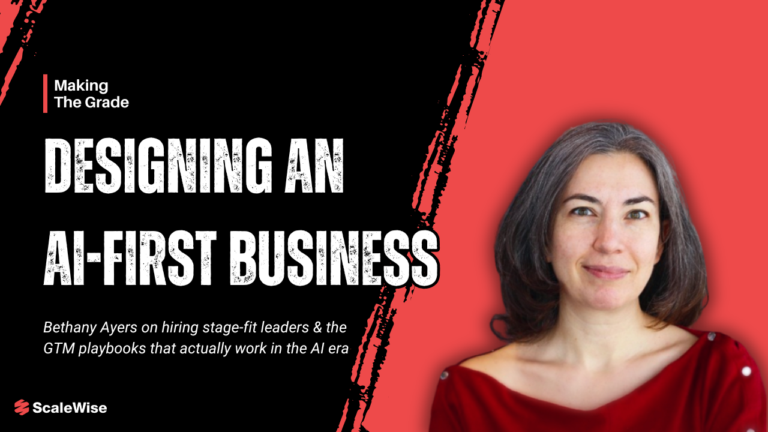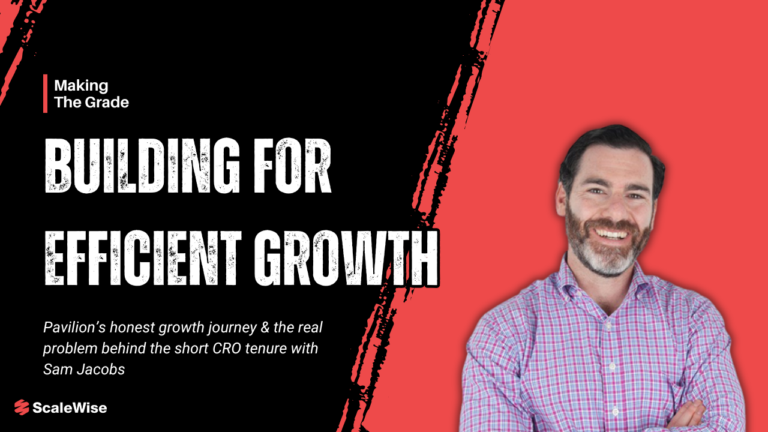Chief Revenue Officers (CROs) are on trend. According to McKinsey, “companies founded between 2016 and 2022 hired CROs about twice as fast as companies founded between 2009 and 2015.” Given Mckinsey also found CROs can boost revenue growth by 1.8x, this surge in popularity may seem unsurprising, but there’s a catch: not every company needs a CRO.
In fact, hiring a full-time CRO too early can have the opposite effect: draining your resources, wasting valuable time and stifling growth.
So when should you hire a CRO? Use this three-stage checklist to see if you’re ready.
1. Do you have the resources?
Before considering whether you ‘need’ a CRO, check if you have sufficient resources to sustain a full-time CRO hire. In the UK, full-time CROs command an average base salary of £180k-300k depending on scaling stage and experience with double OTE (on target earnings) meaning that total cash compensation can be £360k+ per year. This will be in addition to pension contributions and other benefits, including equity ranging from 0.5-1.5%.
For instance, if you’ve recently hit £1 million in ARR or received less than £5 million in investment funding, taking on a full-time CRO could lead to spiralling costs that ultimately impact your unit economics and capital efficiency. At this early stage, CROs are also unlikely to be the right fit for the scrappy scaling work required. That’s why most companies that take on a full-time CRO will either be post Series B with a repeatable engine or a well-funded Series A with aggressive growth expectations.
2. Do you actually need a CRO?
Chief Revenue Officers have a clear mission to grow revenue – be it through new market expansion or scaling your current commercial function. If you’re not currently focused on driving substantial revenue growth then hiring a CRO is like buying an expensive race car only to keep it in the garage.
In general, CROs have three core responsibilities, so consider whether you need the following:
- CROs are responsible for driving significant revenue growth.
Are you ready to prioritise revenue generation or do you have other priorities, such as product development or establishing product-market-fit? CROs won’t be best placed to help in these areas but, unfortunately, we see a lot of companies hiring CROs before they are ready to scale revenue. - CROs take on responsibility for your entire commercial function.
Do you have Sales, Marketing, Customer Success and RevOps functions each with their own line managers? CROs sit above these commercial functions and are most effective when they’re managing managers. If you bring them in to manage individual contributors, they’ll get dragged into the operational weeds and you won’t benefit from their strategic value. - CROs lead the global GTM strategy.
Are you expanding into new markets, launching new products or looking to increase your total addressable market (TAM)? If you’re still working out your value prop, Ideal Customer Profile and sales process, then taking on a CRO is like hiring a conductor before you’ve assembled an effective orchestra.
3. Do you have any of the following ‘CRO flags’?
Look for telltale signs that a CRO would benefit your company today. These include:
- Complex commercial problems – If you’re selling multiple products in multiple markets to a range of customer profiles, a CRO can simplify the go-to-market approach and bring structure to a complex strategy.
- Commercial VPs needing direction – If you have all your commercial VPs in place (i.e. Sales, Marketing, Customer Success, RevOps and Partnerships), a CRO can manage these leaders, providing direction and strategic guidance as you scale.
- Sales & marketing misalignment – If you’re suffering from bottlenecks along the customer journey, a leaky revenue funnel or finger-pointing between sales and marketing leaders, it’s often time for a CRO.
- VPs exposed in the boardroom – If your commercial VPs are out of their depth with investors or struggling with board-level tasks (i.e. compiling a GTM strategy deck), a CRO can bridge the boardroom gap.
- Too much C-Suite – If you’ve already hired C-level positions (i.e. CPO, CFO, CTO etc.) and need to give the commercial function equal standing, then hiring a CRO can give your company revenue an authoritative voice at the table.
Do what’s right for you
Start-ups are engaging CROs earlier than before – especially in the US. But just because other companies are diving into the CRO market, it doesn’t mean you should.
To find out if you need a CRO, check out our Ultimate Guide to Hiring a CRO or get in touch for a free CRO-readiness evaluation.






